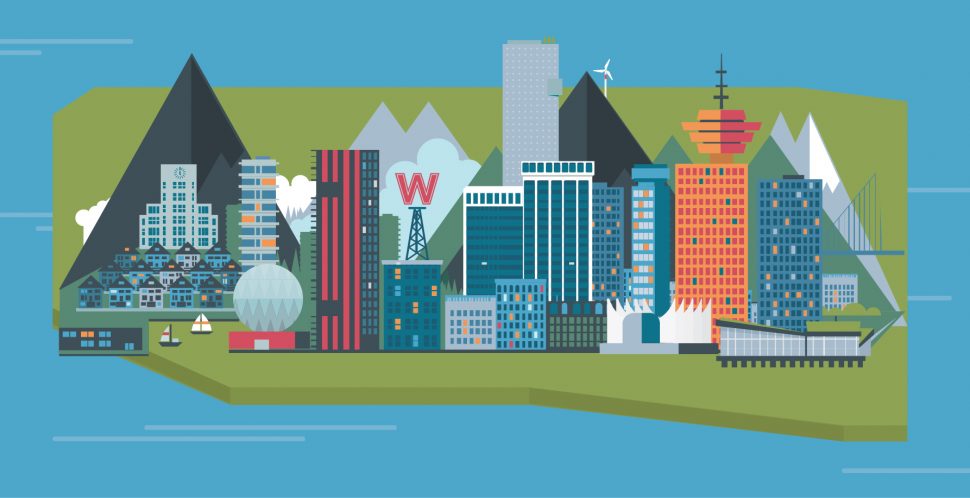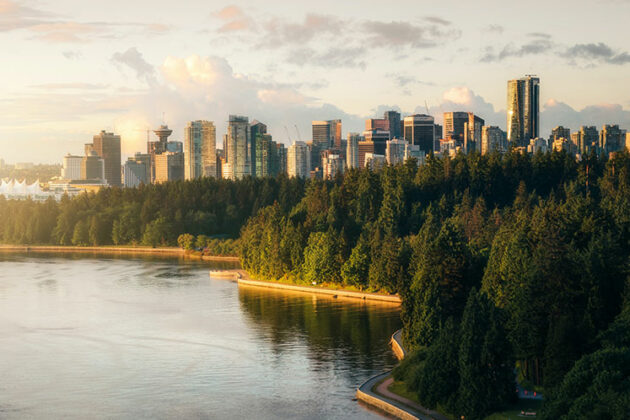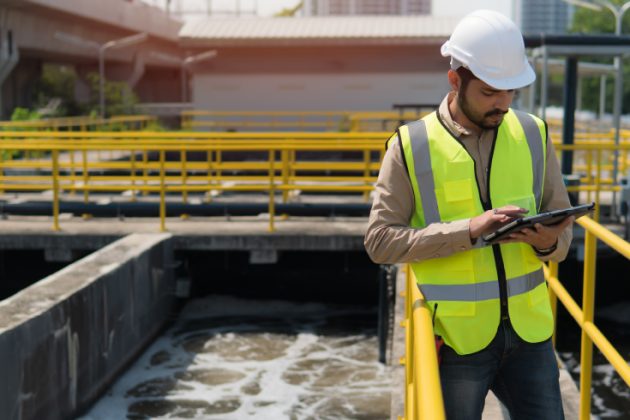“If we’re an island of green, we’re f***ed.” This has become the unofficial motto of the Vancouver Economic Commission’s (VEC) green team and an implicit guide to our work beyond Vancouver’s borders.
The role of municipal governments in tackling climate change is growing. More than 50 per cent of the world’s population lives in cities—cities that are responsible over 70 per cent of global GHG emissions and 80 per cent of global GDP. Cities therefore have the responsibility to create healthy places to live and work, and to take aggressive action on climate change while generating economic opportunity and building employment capacity.
Vancouver has taken this role seriously and succeeded in reducing community GHG emissions by 15 per cent since 2007 while steadily increasing employment and economic activity. However, Vancouver can feel like a very small island of green in an ocean of climate change deniers and fossil-fuel interests, especially given the notable absence of climate action from federal election campaign promises happening south of the border
—But there is hope yet.
Cities Lead the Charge
A week ago, the VEC had the privilege of participating in the Carbon Disclosure Project (CDP) Cities Workshop. CDP is a global not-for-profit helping investors, companies, cities, states and regions to measure and manage their environmental impacts. The organization also aggregates environmental data for use by policy advocacy groups, decision makers and politicians.
At the Cities Workshop, the gathering included sustainability leaders from municipal governments across North America, a senior environmental policy advisor from the White House, the Mayor of Las Vegas, and a handful of large businesses tackling their own carbon footprints head on. In their presence, Vancouver didn’t feel like an island of green but a leader within a global movement spearheaded by cities and companies—with or without the support of our federal leaders.
In Florida, despite the governor’s efforts to ban the use of the term “climate change” by any government employee, municipal governments are taking action to reduce their communities’ carbon footprints and build resilience against sea level rise. In Las Vegas, the culture of gluttony, waste, and massive electricity use doesn’t make it past the doors of the extravagant resorts, where many of the roofs generate significant amounts of solar power, and waste streams are sorted for recyclables and recoverables before leaving the building.
The VEC was invited to the CDP Cities summit to speak on why we think it’s important for the cities to collaborate with business leaders on environmental issues and to discuss the myriad of ways in which cities and companies collaborate on climate action in Vancouver. In the true spirit of Las Vegas, we discussed climate change in gambling terms—the language of risk and reward.
Climate Action: Risk and Reward
First, the risks. We all know the global risks associated with climate change (and if you feel like you need a refresher, Leonardo DiCaprio breaks them down excellently in his latest climate change documentary, Before the Flood). What do we risk if cities operate in isolation from businesses on this issue?
A couple of years ago, we developed a Business Energy and Emissions Profile for Vancouver in partnership with Climate Smart. What we found is that energy use and emissions from business operations make up approximately 40 per cent of our total emissions in Vancouver.
We don’t stand a chance at reaching the ambitious goals we’ve set of becoming 100 per cent renewable energy, zero waste, or the greenest city if we’re not partnering with the business community on this mission.
As for the rewards, they are diverse and plentiful. For many businesses, reducing their carbon footprint results in tens of thousands of dollars in annual cost savings. Moreover, taking a stand on climate issues will help attract new talent and keep existing employees engaged in their work, as well as expand businesses’ customer base and build client loyalty.
This doesn’t even touch on the employment, innovation, and economic growth potential that exists in Vancouver’s green economy. More than one in 20 Vancouverites work in green sectors and over 25 per cent of Canada’s cleantech companies are based here on the west coast.
So what is VEC’s role in bridging climate action taken by the City and businesses?
Here are just a few of the examples we’ve been sharing with our peers across the continent:
- Supporting cleantech entrepreneurs as they cross the commercialization gap through the Green and Digital Demonstration Program;
- Advocating for stronger local and global action on climate change at COP 21 in Paris and beyond through Climate Pledge YVR;
- Inspiring and supporting businesses that are reducing the environmental footprint of their operations through our Thriving Vancouver greening business programs; and
- Setting the stage for our industrial core to become the engine of sustainability and innovation for the city, starting with the Flats
While this week has felt more than a little dismal, it’s not quite time to give in to rocking back and forth and moaning softly – as much as we would like to) – while election results roll in. We are not, after all, an island of green. CDP is working with more than 500 cities globally to manage over two gigatons of greenhouse gas emissions. Meanwhile, Vancouver has its own trump card—an ability to lead and inspire climate action in cities around the world.
 Pietra Basilij
Pietra Basilij
Pietra is the Vancouver Economic Commission’s lead on sustainable community development. She works primarily with industrial businesses to spur the shift to a more circular economy, support the development of smarter logistics systems, and create a stronger business ecosystem for innovative, creative, and sustainable industrial operations.



